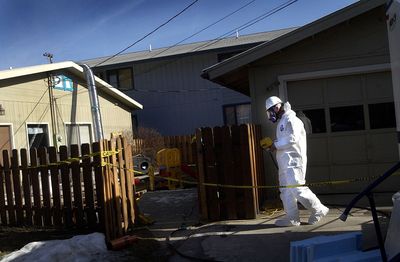Agency declares health emergency in polluted Libby
EPA decision triggers federal funding

WASHINGTON – The Obama administration said Wednesday it will pump more than $130 million into a Montana town where asbestos contamination has been blamed for more than 200 deaths.
EPA Administrator Lisa Jackson said the agency for the first time has determined there is a public health emergency in a contaminated community, targeting Libby, Mont., for immediate federal attention.
Jackson’s announcement will not result in an evacuation of Libby’s 2,600 residents, but it will require an extensive, home-by-home cleanup and better health protections for those with asbestos-related illnesses.
The EPA will invest at least $125 million over the next five years in the ongoing clean up of Libby and Troy, Mont., a nearby town of about 1,000. The Health and Human Services Department will spend an additional $6 million on medical assistance for residents suffering from asbestos-related illnesses.
The money is in addition to hundreds of millions of dollars the government and Maryland-based W.R. Grace & Co. have spent to clean up Libby, where asbestos contamination from a now-closed vermiculite mine has been cited in the deaths of more than 200 people and illnesses of thousands more.
Before the vermiculite mine was closed in 1990, miners carried asbestos home on their clothes. Vermiculite once covered school running tracks in Libby, and some residents used vermiculite in their home gardens.
Jackson called Libby a “tragic public health situation” that has not received the recognition it deserves from the federal government. “We’re making a long-delayed commitment to the people of Libby and Troy,” Jackson said. “Based on a rigorous re-evaluation of the situation on the ground, we will continue to move aggressively on the cleanup efforts and protect the health of the people. We’re here to help create a long and prosperous future for this town.”
Jackson said the announcement marked the first time the EPA has made such a determination under authority of the 1980 Superfund law that requires the cleanup of contaminated sites. The EPA had previously declared the area a Superfund site.
Sen. Max Baucus, D-Mont., called the emergency declaration a great day for Libby, which he said “had to wait year after year as the last administration failed to determine that a public health emergency exists.”
Baucus called the health announcement especially welcome, given what he called a disappointing verdict last month in a criminal case related to the asbestos contamination. W.R. Grace & Co. and three former executives were acquitted of federal charges that they knowingly allowed residents of the town to be exposed to asbestos from its vermiculite mine.
The company has not denied that asbestos came from its mine, but has said it acted responsibly to clean up the contamination.
It paid millions in medical bills for residents of Libby and Troy and agreed last year to pay $250 million to reimburse the EPA for cleanup efforts.
Gayla Benefield of Libby, who suffers health effects from asbestos exposure and lost both parents to asbestos-related lung diseases, called the declaration “a giant step forward” for improved medical care and cleanup of the town.
“Right now the amount of money is relatively minimal, but overall the biggest thing is that it opens the door for future money to be available for medical care, research – the things we’ve needed, independent of W.R. Grace in terms of health care,” she said.